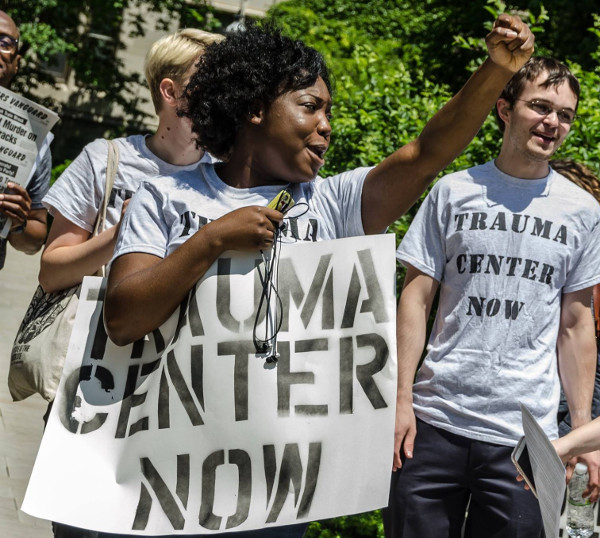
waiting for a bus, was shot. He had to be transported to a hospital 10 miles away and died.
PHOTO/SARAH JANE RHEE
You have to be rich to get good healthcare in America. One in three Americans say they have trouble paying medical bills. Even the relatively few people who have good-paying jobs and insurance can barely afford to go to the doctor, and a brief hospital stay can bankrupt a person. People have lost their savings and their homes to medical debt, or been forced to cut back on necessities like heating oil and groceries to pay medical bills. The question is simple: Is good healthcare to be a commodity sold for profit, or is it a basic human right to be guaranteed to all by society?
By one estimate, nearly 45,000 people die in the US each year because they don’t have health insurance. Even with Obamacare, at least 33 million are still uninsured, and millions more are underinsured. Among those who got insurance in the last 12 months, 39% can’t afford routine expenses like doctor visits and medications. Among the uninsured, 78% say they cannot afford routine medical expenses.
Our healthcare system in the US evolved as a way to keep workers healthy so they could be available for work. But in the last 40 years, the economy has been transformed by the computer and the robot, which are permanently reducing the need for workers, so the healthcare system is being cut back and made more profit-oriented. Obamacare accelerates a process that was under way of reducing both the quality and quantity of care available to workers, privatizing public health insurance programs like Medicare and Medicaid, raising prices, forcing smaller hospitals and clinics to close, and shifting more costs to the workers.
Today, billions are made in profits from a healthcare system that more and more people simply can’t afford. At the same time, new life-saving treatments are being developed every month, but only those who can afford to pay get access to them.
Labor-replacing technology means that, more and more, we can no longer circulate commodities like healthcare based on money changing hands; the technology is eliminating jobs and people with no jobs have no money. The technology will get more and more capable, and there will be fewer and fewer jobs. In the end, we will have to move toward a cooperative society where the people, not a handful of billionaires, own the means of producing what we need, and everything, including healthcare, is distributed based on need.
We can take a step in that direction by doing what most other advanced countries have done: create a publicly financed health system that nationalizes every aspect of healthcare—doctors, pharmaceutical companies, hospitals, emergency services, etc.—and that guarantees high quality healthcare to everyone. Healthcare is a human right, and should be available to everyone who lives in our country, including the undocumented. The struggle for a single-payer government-run insurance system that guarantees health coverage for all is a first step toward nationalizing healthcare.


Finally!!!
I’m grateful for the ACA but I’m having problems with it. I can barely afford it, like many other people. My husband nearly died and the medical bills drove us to bankruptcy. Noone should be pit in this position.